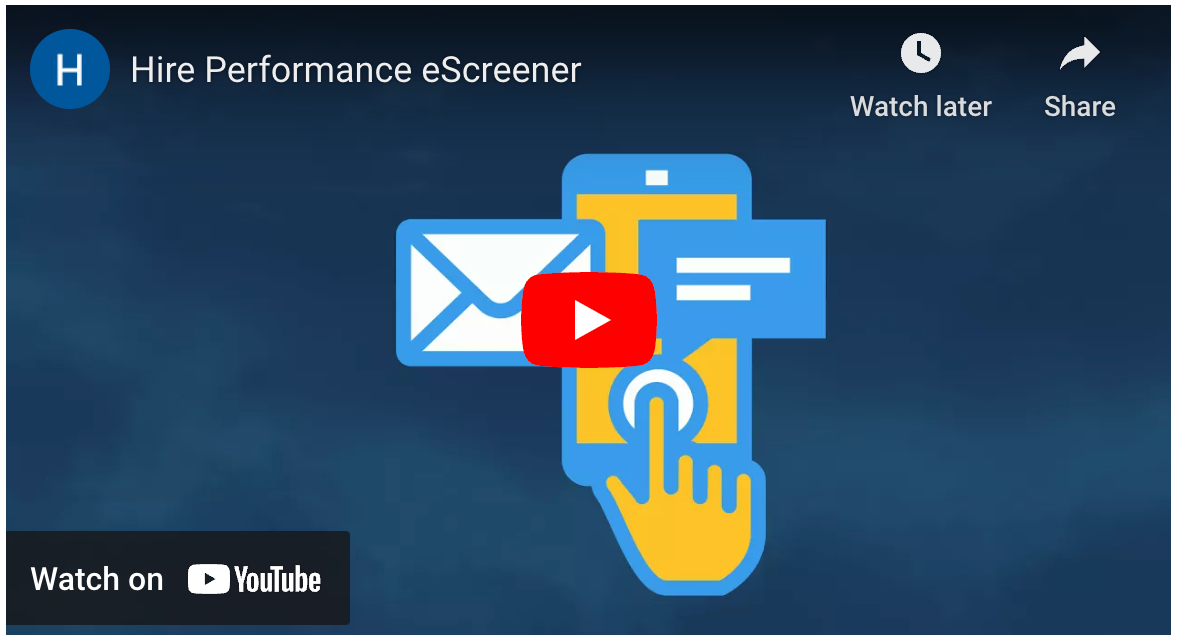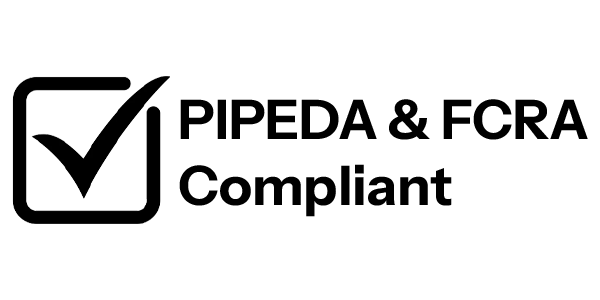Is it Legal to Conduct Background Checks on a Job Applicant?
Tim Hardie • May 16, 2024
Background checks are a powerful tool that help companies hire qualified and low-risk candidates. There are several types of background checks, but they all work towards this goal — only hiring the best candidates.
Is it legal to conduct background checks in Canada? Yes, but the regulations vary based on the specific type of background check. You must know the legal requirements and your responsibilities in meeting them.
Conducting a background check involves several legal requirements and other considerations. Failing to meet these requirements can result in severe penalties and other consequences, making background checks a possible liability for your organization.
Having a strong grasp of the regulations surrounding background checks helps ensure your background check partner is fully complying with them. So, we’ll be breaking down everything you need to know to make informed decisions by using legally compliant background checks.
Why Should You Conduct Background Checks?
Background checks are a common practice to ensure new hires are the right choice for your company. In some situations, a simple check ensures applicants are who they say they are. In others, criminal background checks or driving record checks help avoid taking on the risk of hiring the wrong candidate.
While some industries and roles require specific background checks, others may still benefit from implementing them. However, it’s critical to understand background checks' legality and ensure your processes fully comply with them.
While background screening can be valuable to your organization, it can become a liability if acquiring, using, or storing data violates regulations. Understanding the specific requirements and working with the right partner is crucial to remain compliant.
The Legality of Running a Background Check in Canada
What are the requirements for running a background check in Canada? While it’s wise to consult a lawyer for specific answers relevant to your organization, the following guidelines apply to legally conducting background checks:
- Employers must have a valid reason for conducting the background screening.
- Employers must directly tell applicants that the specific type of background check is part of the hiring process.
- Employers must obtain written consent to conduct the checks and the type of information that will be reviewed.
- Data privacy and protection laws such as the Personal Information Protection and Electronic Documents Act (PIPEDA) also apply, which dictates how industries need to transfer and store personal data.
Abiding by these requirements is crucial for the hiring process and your organization overall. Otherwise, you may risk fines and penalties for not complying with legal requirements.
Be Aware of Regulations from Municipalities, Provinces, or Territories
The above regulations are at the government level, so they apply broadly. However, you’ll need to investigate other regulations specific to your local and provincial area. These other levels of government may impose restrictions on how background checks can be conducted or overall data privacy requirements.
Working with a reputable background check provider can go far in helping your organization remain compliant. The right partner will be versed in the varying regulations that apply to your business, including those at all levels.

Understanding Different Types of Background Checks
A background check is an overarching term encompassing a wide variety of specific checks, but organizations may require several specific types of checks. Each type of check has a different goal and leverages varying data sources.
Understanding these background checks is vital to fully complying with their associated legal requirements — so let's review them.
Social Media Background Check
Social media checks can be a strong asset to the hiring process for some industries. However, while the information from social media is typically publicly available, you may still face discrimination or related issues if you improperly use this information.
A social media check's main goal is for businesses to ensure the candidate won’t bring controversial or unwanted attention to the company. You’ll have to walk a fine line when using social media background checks in your hiring decisions, as they can be a valuable tool and a liability if used incorrectly.
Driving Record Check
Any role that involves regular driving should include a driver's abstract, especially if it involves driving a company vehicle. More commonly known as a driving record check, these checks focus on data from provincial motor vehicle agencies and police records to understand the candidate's past infractions.
There are different types of driving record checks, and you should choose the type that acquires the least amount of information necessary to make your decision and comply with any related requirements.
For example, your business insurance might require that you obtain and fully document the specific information about the candidate’s driving record. You should run the necessary background checks to meet these requirements but avoid gaining unnecessary information about the candidate.
Running a driving record check for a role that does not involve driving in any capacity may violate federal requirements, as you’ll be gaining sensitive information that isn’t relevant to the role.
Resume and Reference Check
These common checks verify employment history and references. Other information including the reason for leaving, job duties, strengths and weaknesses, work habits and stress management may also be obtained. These checks help ensure the candidate accurately reports all relevant information.
Like other background checks, you must acquire consent from the candidate to verify resume information and references. Additionally, only the least amount of information necessary to decide should be retrieved. You can reference our
privacy policy page to learn more about the information collected.
It’s critical to stay professional and only ask relevant fact-checking questions when conducting these checks if handling them directly. Straying into personal questions about the candidate may violate privacy laws. Any information you gain during the process should be securely documented and stored to avoid data protection concerns.
Credit Check
While we’re used to credit checks when we apply for a loan, an employment credit check is looking for any delinquencies, significant balances, and a lower score — all of which may indicate a high-risk candidate.
Someone with a pattern of unreliable financial decisions can be a factor in hiring in some industries. A bad credit score isn’t relevant in many industries, but it can be an important factor in hiring the right candidate for financial roles.
However, it’s important to conduct these checks only when necessary and ensure you use the information appropriately. A credit check is typically only conducted in the financial industry or specific roles involved in finances.
As with other checks, the employee data gained from credit checks should be used only as relevant to the specific role. Using other data, such as age, in hiring decisions may violate legal regulations.
Considering the sensitive information in a credit report, this data must be securely stored or destroyed once it’s no longer needed. Make sure you don’t risk exposing sensitive information to other employees or malicious actors.
Criminal Record Check
A criminal record check in Canada should only be conducted when necessary and relevant to the specific role. Employers cannot discriminate based on a criminal history, as this information can only be used to make hiring decisions in specific roles and industries.
There are a few types of criminal record checks, but they all share the goal of making sure you know everything necessary about a client’s background to avoid any additional concerns. The main types of criminal record checks are:
- Criminal Record Check (CPIC: Canadian Police Information Centre): CPIC checks conduct a criminal record check by using an applicant's date of birth and name. The base-level checks search for convictions, while premium checks also look for any pending, withdrawn, or non-conviction data.
- Enhanced Criminal Record Check (CPIC + PIP): Similar to a Vulnerable Sector Check (VSC), an Enhanced Criminal Record Check protects businesses when hiring employees who are in positions of trust or authority over children or vulnerable persons. It is provided by your local police department with the additional search of the pardoned sex offender database.
- Fingerprinting: In cases where a name-based criminal record check can't definitively confirm identity, fingerprints may be required for employment background checks, ensuring more accurate and reliable results. These checks use fingerprints and can be certified for an additional fee, offering greater trust in certain industries, even though the process may take longer.
While some checks are considered more universally relevant, conducting criminal checks requires documented consent from the applicant and needs to be necessary for the given industry or role. Making it a standard practice may result in discrimination concerns.
It’s Vital to Have the Right Background Screening Processes and Tools
Background checks are a common process involved in hiring new employees and are often completed after the initial interview. While they all have different focuses, the overarching goal is to learn more about the candidate and double-check any information they’ve provided.
One aspect of Canada’s regulations regarding background checks is receiving consent, only running necessary checks, and using the information appropriately.
Hire Performance has decades of experience running background checks quickly and efficiently. We’ve leveraged our expertise to develop the
eScreener — our leading cloud-based platform for requesting, monitoring, and reviewing background checks.
Our platform fully complies with legal requirements regarding data privacy and protection so you can focus on making the hiring decisions. As one of the leading Canadian background check companies, we know how to comply with all applicable regulations and requirements to keep your background checks legal.
Ready to improve and streamline your hiring processes?
Book a demo today to see our platform in action and learn more about how it can help your organization.

Industry Leading Technology for Background Checks & Screening
eScreener uses Kount Identity Verification™ technology to verify identity with confidence. This technology cross checks applicant information against Equifax and 3rd party data sources to validate an identity and to determine whether that identity has been reported as misused or associated with potential fraudulent activity. This is done in real time by accessing millions of records, providing instant results in our eScreener.
WHY CHOOSE HIRE PERFORMANCE?
Pre-Employment Screening Benefits
Our industry leading expertise and cutting edge technology help organizations detect potential risks such as resume fraud, criminal convictions, and past terminations.












